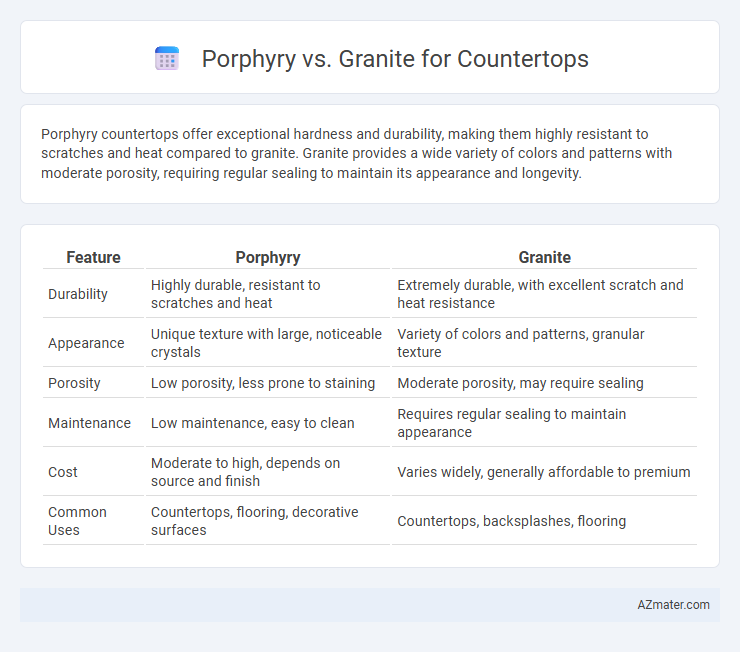Porphyry countertops offer exceptional hardness and durability, making them highly resistant to scratches and heat compared to granite. Granite provides a wide variety of colors and patterns with moderate porosity, requiring regular sealing to maintain its appearance and longevity.
Table of Comparison
| Feature | Porphyry | Granite |
|---|---|---|
| Durability | Highly durable, resistant to scratches and heat | Extremely durable, with excellent scratch and heat resistance |
| Appearance | Unique texture with large, noticeable crystals | Variety of colors and patterns, granular texture |
| Porosity | Low porosity, less prone to staining | Moderate porosity, may require sealing |
| Maintenance | Low maintenance, easy to clean | Requires regular sealing to maintain appearance |
| Cost | Moderate to high, depends on source and finish | Varies widely, generally affordable to premium |
| Common Uses | Countertops, flooring, decorative surfaces | Countertops, backsplashes, flooring |
Introduction to Porphyry and Granite Countertops
Porphyry countertops are crafted from a coarse-grained igneous rock known for its durability and unique reddish or purple hues with large feldspar crystals, making them a striking choice for kitchen and bathroom surfaces. Granite countertops, composed primarily of quartz, feldspar, and mica, offer exceptional hardness, scratch resistance, and a wide range of colors and patterns that fit diverse design preferences. Both materials provide robust, heat-resistant surfaces ideal for heavy-use environments, but Porphyry's distinctive texture and rarity set it apart as a premium option compared to the more common and widely available Granite.
Composition and Appearance Differences
Porphyry countertops feature large, distinct mineral crystals embedded in a fine-grained matrix, primarily composed of feldspar and quartz, giving a unique and bold texture. Granite consists mainly of quartz, feldspar, and mica, displaying a more uniform and granular appearance with a wide range of colors and patterns. The pronounced crystals in porphyry create a striking aesthetic contrast, while granite offers consistent speckled patterns ideal for versatile design preferences.
Durability and Strength Comparison
Porphyry countertops exhibit exceptional durability and strength due to their dense crystalline structure and resistance to scratches, cracks, and heat, making them ideal for high-traffic kitchens. Granite offers robust hardness and strong resistance to impact and heat but may be more prone to chipping and requires regular sealing for stain protection. Porphyry's superior toughness and lower porosity often result in longer-lasting, low-maintenance countertops compared to granite.
Maintenance and Cleaning Requirements
Porphyry countertops require minimal maintenance due to their dense, durable surface that resists scratches and stains, making routine cleaning simple with mild soap and water. Granite countertops, while also durable, need periodic sealing to prevent staining and moisture absorption, which involves more upkeep compared to porphyry. Both materials benefit from avoiding harsh chemicals and abrasive cleaners to preserve their finish and longevity.
Heat and Stain Resistance
Porphyry countertops exhibit superior heat resistance with a high melting point around 1200degC, making them ideal for kitchen environments prone to hot pans and appliances. Granite also offers strong heat resistance, typically withstanding temperatures up to 600degC to 800degC without damage. Porphyry's dense, low-porosity structure enhances its stain resistance, while granite may require regular sealing to prevent absorption of oils and liquids, maintaining countertop durability and appearance.
Cost and Budget Considerations
Porphyry countertops typically cost more than granite due to their rarity and unique mineral patterns, with prices ranging from $75 to $125 per square foot compared to granite's $40 to $100 per square foot. Budget-conscious homeowners may find granite a more affordable and versatile option, offering a wide variety of colors and patterns without compromising durability. Porphyry's higher price reflects its luxury status and exceptional resistance to wear, which can justify the investment in high-end kitchen designs.
Installation Process and Complexity
Porphyry countertops require specialized cutting techniques due to their hardness and unique grain structure, making the installation process more complex than granite. Granite is relatively easier to cut and shape, allowing for quicker fabrication and installation with standard stone-cutting tools. Both materials need professional installers to ensure precise fitting and secure adhesion, but porphyry demands more experienced craftsmanship to prevent chipping and ensure a flawless finish.
Design Versatility and Aesthetic Appeal
Porphyry countertops showcase unique, large crystal formations within a fine-grained matrix, offering bold, dramatic aesthetics that enhance modern and rustic designs alike. Granite features a wide spectrum of color variations and patterns, making it highly versatile for traditional, contemporary, or transitional kitchen themes. Both materials provide durable, visually striking surfaces, but granite's extensive palette and subtle veining often appeal to homeowners seeking customizable elegance.
Environmental Impact and Sustainability
Porphyry countertops exhibit lower environmental impact compared to granite due to their durability and slower rate of extraction, reducing the need for frequent replacement and mining disruptions. Granite, being more abundant but heavily quarried, often involves energy-intensive processing and significant waste production, contributing to higher carbon footprints. Choosing porphyry supports sustainability through longevity and minimal resource consumption, making it a greener option for eco-conscious kitchen designs.
Which is Better: Porphyry or Granite Countertops?
Porphyry countertops offer exceptional durability and resistance to heat and scratches, making them ideal for high-traffic kitchen areas, while granite provides a wider range of colors and unique natural patterns that enhance aesthetic appeal. Porphyry's dense, fine-grained texture offers superior stain resistance compared to granite's more porous surface, which may require regular sealing for maintenance. Choosing between porphyry and granite countertops depends on prioritizing either long-lasting toughness or diverse design options for the kitchen space.

Infographic: Porphyry vs Granite for Countertop
 azmater.com
azmater.com